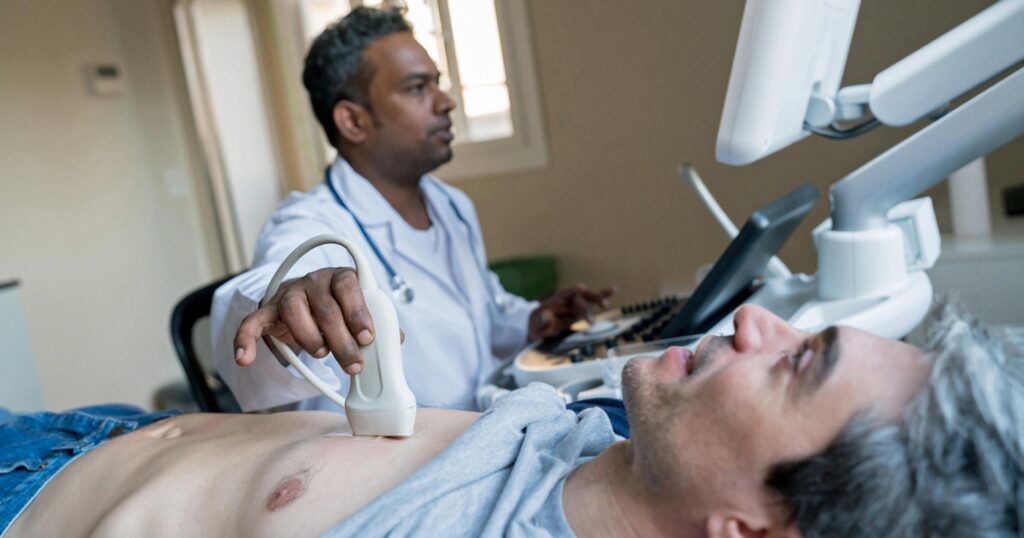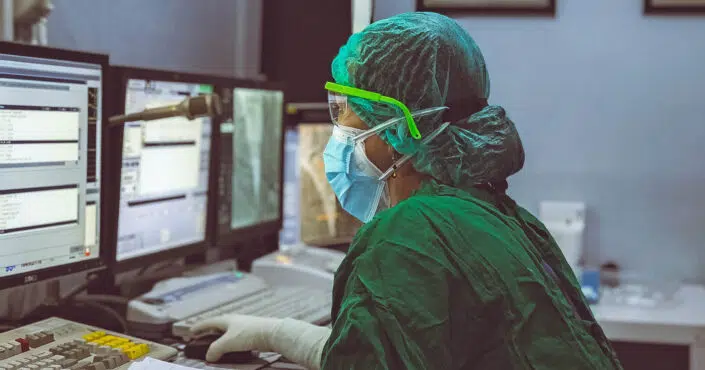Allied health travel jobs encompass a slew of medical workers in a wide range of fields, from lab and radiology techs to respiratory and occupational therapists, among many others. While you’re probably used to hearing about travel nurses, allied health workers also have the opportunity to travel, and many do. Some of the best allied health careers are also some of the fastest growing, meaning you’ll be an in-demand healthcare professional no matter where you go. If you’ve ever had questions about travel allied health jobs, this comprehensive FAQ is for you.
What is Allied Health Travel?
For the most part, allied health travel jobs work much like travel nursing. Traveling allied health professionals fill short-term positions at healthcare facilities around the nation with temporary openings due to seasonal population fluctuations, maternity leaves, vacations, global pandemics, or various other reasons.
Allied health travelers may be technicians, technologists, therapists, or other healthcare professionals with the freedom and flexibility to decide where they want to work, with the proper credentials. Travel careers provide an ideal opportunity to visit different parts of the country while earning a sizable salary. Like travel nurses, travel allied health professionals typically earn more than their staff counterparts.
What is the Highest-Paying Allied Health Job?
Many lucrative career choices exist in allied health. The top five highest-paying allied health jobs consistently include cardiac cath lab technologists, occupational therapists, speech-language pathologists, clinical lab scientists, and physical therapists. However, the highest-paid allied health careers can significantly vary based on location, facility, education, experience, and professional certifications.

Which Allied Health Fields Are Experiencing the Fastest Employment Growth?
Some of the highest-paid allied health careers are in fields that are growing faster than others. According to the Bureau of Labor Statistics (BLS), between 2020 and 2030, the projected growth in several top allied health professions is exceptionally high, including:
- Occupational therapists: 17%
- Occupational therapist assistants: 34%
- Medical assistants: 18%
- Diagnostic medical sonographers: 19%
- Physical therapists: 21%
- Physical therapist assistants: 32%
- Phlebotomists: 22%
- Respiratory therapists: 23%
- Speech-language pathologists: 29%
- Physician assistants: 31%
Can You Travel as a Pharmacist?
Yes, pharmacists can travel and are in high demand in many areas. The top five states with the highest pharmacist salaries on Vivian Health in July 2022 were New Mexico, Washington, Texas, Hawaii, and Arizona. However, two of the top five highest-paying cities were in California. Travel pharmacists are just like permanent pharmacists, except they travel the country filling temporary staffing needs.
The primary qualifications for travel pharmacist jobs are a Doctor of Pharmacy degree and a license to practice in the appropriate state. Potential employers may also have various requirements or preferences for travel pharmacists, but they all typically require a certain amount of experience. Experience requirements usually range between two years and five-plus.
What is a Travel Cath Lab Tech?
Catheterization laboratory technicians are allied health professionals specializing in cardiovascular technology and running tests to determine heart health. Cath lab techs primarily perform cardiac catheterizations to check for blockages in blood vessels and tests to see how well the patient’s heart is working.
Travel cath lab techs perform the same tasks only on temporary contracts at different facilities around the country. Travel positions usually require two years of cath lab tech experience, including recent experience, and may require experience in a hospital setting. You may need a license and/or certification to practice in some states.
What Do Travel Respiratory Therapists Do?
Respiratory therapists are allied health professionals who specialize in improving patients’ lung function to help them breathe better. Travel RTs perform the same tasks as staff RTs, including diagnosing and treating many diseases, illnesses, and injuries that affect the respiratory system.
Travelers must have advanced knowledge of the pulmonary system, lung health care and relevant high-tech equipment, such as ventilators. RTs must be licensed by the appropriate state board, which often requires earning the Certified Respiratory Therapist or Registered Respiratory Therapist credential from the National Board for Respiratory Care. You usually need at least one year of clinical experience to apply for travel respiratory therapist jobs, but many facilities prefer two years of experience.
Do Radiation Therapists Get to Travel?
Yes, radiation therapists can travel, but they must fulfill appropriate state requirements. However, some requirements are relatively universal. Good allied health travel recruiters help you with the licensing process, so it’s less stressful and time-consuming.
Radiation therapists typically need an associate or bachelor’s degree in radiation therapy. Most states require radiation therapists to be licensed or certified, which often includes passing a national certification exam. The BLS estimates that the employment of radiation therapists will grow 9% from 2020 to 2030, and travel radiation therapist salaries are typically higher than those earned by staff therapists.
Are Travel Medical Tech Jobs Worth It?
Besides getting to travel virtually free of charge, two of the biggest perks of allied health travel jobs are more money and more opportunities. This is true of travel medical tech jobs, so if you like to travel, it’s definitely worth it. The average medical technologist salary on Vivian Health was $2,410 per week in July 2022. The site had 700 travel med tech jobs posted at 193 facilities nationwide, including some paying as much as $6,160 per week.
What is a Travel Echo Tech?
Echocardiograph technicians, or echo techs, are allied health professionals who conduct diagnostic exams with an echocardiogram to create live images of patients’ hearts. Travel echo techs perform the same duties as staff techs, which primarily include gathering data doctors need for diagnosing heart disease. Travel echo techs may also be called echocardiographers, cardiographers, cardiac sonographers, or EKG technicians because they’re sonographers who’ve specialized in using echocardiogram technology. However, echo techs are highly specialized diagnostic sonographers, so they’re in high demand due to advances in medical technology and an aging population needing detailed cardiac testing.
Travelers in this field typically don’t need licensure or professional certification. State licensure of echo techs and other sonographers is currently required only in New Hampshire, New Mexico, North Dakota, and Oregon, but this could change. Professional certification is mostly voluntary, but employers tend to look more favorably on certified job candidates, such as Registered Cardiac Sonographer (RCS) credentials or Registered Diagnostic Cardiac Sonographer with an Adult Echocardiography (RDCS-AE) credential.
How Much Do Travel Mammography Tech Jobs Pay?
Travel mammogram technicians earned an average rate of $2,468 per week on Vivian during the third week of July 2022, which was 1% higher than the U.S. average for allied health travel jobs. Nearly 200 travel mammography tech jobs were available during this period, with some paying as much as $4,175.

What is a Traveling CT Tech?
Computed tomography technicians are allied health professionals specializing in computerized X-ray imaging procedures. Travel CT techs perform the same duties as staff techs. They operate CT equipment to produce internal cross-section images of patients’ bones, soft tissues, and internal organs to help diagnose diseases, monitor the effectiveness of treatments, evaluate internal injuries, or guide surgeries or biopsies. They also prepare patients for CT procedures by correctly positioning them to capture the best images and explaining the process. Travelers must have an associate or a bachelor’s degree in radiologic technology from a JRCERT accredited program. State licensure and/or radiology or computed tomography certification may be required.
What Do Travel X-ray Techs Do?
X-ray technicians are allied health professionals who specialize in using radiologic imaging equipment to produce images of patients’ body parts for diagnostic purposes. Travel X-ray techs perform the same duties as staff techs, so they use cutting-edge imaging methods to provide images of the inside of patients’ bodies in a non-invasive manner. Doctors use these images to diagnose and treat injuries and illnesses more accurately. The demand for X-ray techs is expected to grow 9% between 2020 and 2030, per the BLS. Most states require X-ray techs to be licensed, and travelers typically need one to two years of experience in the field.
How Do You Get a Travel Allied Health Job?
Opportunities for traveling healthcare professionals aren’t limited to travel nurses. You can also get travel allied health jobs and take advantage of the same perks. Getting allied health travel jobs includes the same educational requirements you’d normally need, then typically comes down to two primary requirements:
- A license and/or certification to practice where you’ll be working, if applicable in your field
- One, two, or more years of experience in your field, preferably in a hospital setting
Other requirements may include professional certifications and standard training, such as Basic Life Support and Advanced Cardiac Life Support. Getting as many relevant certifications as possible makes you more marketable as a travel allied health worker. You generally also need a drug screen, background check, and vaccination records to launch your travel allied health career. Working with an agency geared explicitly towards traveling healthcare professionals makes getting travel jobs easier.
How Do You Find Allied Health Travel Jobs?
One of the quickest and easiest ways to find allied health travel jobs is by creating a reusable profile on Vivian Health. With a single profile, you have access to 1,000s of allied health jobs posted on Vivian’s job portal. The site listed more than 26,000 job postings for travel therapists, technicians, and allied health professionals of all types during the third week of July 2022.
Vivian isn’t a travel nurse and allied health agency but a marketplace meant to empower healthcare professionals to browse jobs with pay transparency. The platform allows you to keep all your messages and applications in one place and sends instant notifications when travel jobs post that match your specifications. You can connect with employers immediately through real-time chat. Vivian has facilitated over 1 million job applications to date.










What does a CCHT get for pay? I’m interested as a dialysis technician.
Hi Lesa and thanks for reaching out. Certified healthcare professionals tend to earn more than those who aren’t, but your actual pay is going to vary based on many factors. Overall experience, work setting, location, permanent versus travel staff and many other factors can impact pay. Per Vivian’s salary data for the first part of December, staff dialysis technician’s earned an average of $28.95 but if you look at the average rates in the highest-paying states, hourly wages ranged from $32 to $37. You can find more salary information for dialysis technicians here: https://www.vivian.com/allied-health/dialysis-tech/salary/.
I am interested. Thank you for writing this information.
Hello Jill and thanks for reaching out! If you’d like to browse the allied health travel jobs Vivian currently has posted, please visit our allied health job page found here: https://www.vivian.com/allied-health/travel/. We currently have over 28,000 allied health jobs posted. If you have any questions about our website, please feel free to use the “Contact Vivian” option under the Resources tab to reach our 24/7 help desk for further assistance. We’re glad you found the information helpful and wish you the best of luck in all your endeavors.